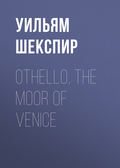
Уильям Шекспир
The Shakespeare Story-Book
Twelfth Night
Orsino’s Envoy
Sebastian and Viola were brother and sister, twins, and they resembled each other so closely that it would have been impossible to know them apart if it had not been for the difference in dress.
Travelling by sea on one occasion, they met with a dangerous adventure, for near the coast of Illyria their ship was wrecked, and though both managed to get safely to land, each feared the other had perished. The captain of the ship, who was saved in the same boat with Viola, kindly befriended her. It happened he knew that country well, for he was born and bred there, and had only left it a month before. He told Viola that it was governed by a Duke, noble in nature as in name, and that this Duke was in love with a fair lady called Olivia. The father and brother of the lady, however, had both died within the last year, and the Countess Olivia out of love for them and grief for their loss had shut herself up in seclusion ever since, and refused to see anyone.
Viola, who had been cast quite destitute on shore, would gladly have served this lady for awhile till the opportunity came to show what was her real estate in life; but the captain said that would be difficult to manage, for the Countess would listen to no kind of suit, not even the Duke Orsino’s. Then the idea came to Viola to disguise herself as a page, and to seek service with the Duke, of whom she had heard her own father speak. She could sing and play to him in many sorts of music, which would make her well worth his service, for the Duke was especially fond of music. The captain promised to keep concealed who she really was, aid her in getting a disguise, and present her to the Duke.
All went well. Viola, with her grace, beauty, and noble bearing, made such a gallant young page that she was received into instant favour, and before three days were over, the Duke, won by some irresistible charm, had confided to “Cesario” (as he called her) all the secret of his unhappy love for the lady Olivia. His suit so far had been rejected, even his messengers were denied admittance; but it occurred to Orsino that if he sent this pretty lad to the Countess perhaps he might be more successful in pleading his cause than some older envoy of graver aspect. He bade Cesario insist on admittance, and refuse to be sent away without seeing Olivia. When he gained speech with the Countess, he was to tell her of Orsino’s devotion, and relate his woes.
“Prosper well in this,” he ended, “and you shall live as freely as your lord, and call his fortunes yours.”
Alas, poor Viola! The Duke little thought what a task he was setting his young page. The sweetness and charm of his own nature had already won Viola’s heart, and how gladly she would have accepted the love which Olivia rejected!
But she must be faithful to her trust.
“I’ll do my best to woo your lady,” she said, and so departed on her mission.
While the lady Olivia lived in grief and retirement, there were others of her household very far from sharing in her desire for quiet and gravity. Her steward, Malvolio, was indeed a staid and respectable personage, stiff in bearing, hating all forms of wit and levity, very fault-finding with others, and extremely well satisfied with himself. Olivia had a real esteem for Malvolio, for she knew him to be worthy and conscientious, although, as she told him, he was “sick of self-love.” But there were others who conducted themselves very differently from Malvolio, and between these noisy dependents and the austere steward there was a constant smouldering resentment, always ready to break into open warfare.
The chief source of unruliness was a certain riotous knight, called Sir Toby Belch, an uncle of Olivia’s, who since her brother’s death had taken up his abode in the house. He loved feasting and revelry, and his wild behaviour was likely soon to bring discredit on the household if some check were not put to it. His boon companion was an idle knight, called Sir Andrew Aguecheek, who under a smattering of foreign languages concealed an unlimited fund of native stupidity. Sir Toby was quite aware of Sir Andrew’s silliness, and loved to laugh at him and parade his folly; but none the less he thought this foolish gentleman would do very well as a husband for Olivia, and he encouraged him to come to the house on every occasion. A third member of the band was Feste, the clown, or jester. Feste was a privileged person, and, like all fools or Court jesters in those days, was allowed to speak his mind much more freely than ordinary mortals; even the stately Countess herself did not escape his sharp speeches. In days gone by, Olivia’s father had taken much delight in him, and now Olivia listened indulgently to his chatter, and rebuked Malvolio for the sour ill-temper with which he tried to snub the fool’s sallies. In addition to his fool’s wit, Feste possessed a gift of real power, a wonderfully sweet voice for singing, and wherever he went could be heard snatches of song, gay and jocund, or plaintive and of touching pathos.
Olivia’s waiting-maid, Maria, regarded Malvolio with no more favour than did the rest of this noisy company. She was a quick-witted, lively young person, delighting in fun, and Malvolio’s solemn primness and rigid severity seemed to her nothing but hypocrisy.
“An affected ass,” she described him, with small reverence, “with the best possible opinion of himself; so crammed, as he thinks, with excellences that he firmly believes that all who look on him love him.”
And it was from this intense self-conceit of Malvolio’s that this mischievous little band of conspirators – Sir Toby Belch, Sir Andrew Aguecheek, Feste the clown, and Maria – found means to revenge themselves by playing a humiliating trick on the pompous steward.
When Viola, in the character of Cesario, reached Olivia’s house, she was at first refused admittance, but as she announced her intention of standing at the door until she had given her message, and absolutely declined to take any denial, Olivia at last consented to see her.
“Give me my veil,” she said to Maria. “Come, throw it over my face. We will once more hear Orsino’s embassy;” and Viola, attended by four or five servants of the Duke, was ushered into her presence.
“The honourable lady of the house, which is she?” she demanded.
“Speak to me; I shall answer for her. Your will?” said Olivia curtly.
“Most radiant, exquisite, and unmatchable beauty,” began Viola, with high-flown gallantry, and enjoying the humour of her own words, for, as Olivia was closely veiled, she could not see whom she was addressing. Not in the least abashed, however, by that lady’s stately dignity, she begged permission to deliver her message, and to speak it to Olivia alone. The quaint impertinence of the pretty lad, his ready wit, and his noble bearing, took Olivia’s fancy, and, instead of dismissing him abruptly, as had been her first intention, she sent away her attendants and bade him speak on.
But when Viola uttered Orsino’s name, Olivia, as usual, drew back. Even from this messenger she had no wish to hear of Orsino’s devotion, and she checked him rather abruptly.
“Have you no more to say?” she added.
“Good madam, let me see your face,” pleaded Viola, for she longed to behold the lady who could so enchant Duke Orsino.
“Have you any commission from your lord to see my face?” asked Olivia, not ill-pleased. “You are now out of your message; but we will draw the curtain, and show you the picture. Look you, sir, such a one I am now. Is it not well done?”
She threw back her veil, and her dazzling beauty shone forth in all its radiance.
Viola gazed at her in admiration.
“Excellently done, if God did all,” she murmured, for she could scarcely believe such loveliness of tint could be natural.
“’Tis in grain, sir; it will endure wind and weather,” replied Olivia.
“It is beauty truly blent, whose red and white were laid on by Nature’s own sweet and cunning hand,” said Viola. “Lady, you are the cruellest person alive if you let these graces go down to the grave and leave the world no copy.”
“Oh, sir, I will not be so hard-hearted,” said Olivia, with gentle sarcasm; “I will give out divers schedules of my beauty; it shall be all entered in an inventory, and duly labelled; as, item, two lips, indifferent red; item, two gray eyes, with lids to them; item, one neck, one chin, and so forth. Were you sent hither to praise me?”
“I see you what you are – you are too proud,” said Viola. “My lord and master loves you. Oh, such love deserves its recompense, though you were crowned peerless in beauty.”
To this Olivia replied that Orsino knew her mind; she could not love him. She knew him to be noble, of great estate and stainless youth, generous in disposition, learned, valiant, graceful, and handsome in person. Yet she could not love him. He might have taken his answer long ago.
“If I loved you as my master does, with such fire and suffering, I would find no sense in your denial,” said Viola. “I would not understand it.”
“Why, what would you do?”
“Make me a willow cabin at your gate, write loyal songs of love, and sing them loud, even in the dead of night,” cried Viola; “call out your name to the echoing hills, and make the babbling air cry out ‘Olivia!’ Oh, you should have no rest, but you should pity me!”
“You might do much,” said Olivia, with assumed sarcasm, but really touched by the young page’s enthusiasm. “What is your parentage?”
“Above my fortunes, yet my estate is good.”
“Get you to your lord; I cannot love him. Let him send no more – unless, perchance, you come to me again to tell me how he takes it. Fare you well; I thank you for your pains. Spend this for me.”
“I am no fee’d post, lady; keep your purse,” said Viola. “My master, not myself, lacks recompense. When your turn comes to love, may your own lover’s heart be made of flint, and may your affection, like my master’s, be held in contempt! Farewell, fair cruelty!”
Viola had done her best for her master, but the only success she had was to win his lady’s heart for herself. The stately lady Olivia, so cold and proud to the noble Duke Orsino, was now forced to own to herself that she found a strange fascination in this young page. He had refused the gift of money which, in accordance with the custom of those times, Olivia had offered, but she could not let him pass out of her sight, perhaps for ever, without a remembrance.
“What ho! Malvolio!” she called.
“Here, madam, at your service.”
“Run after that same peevish messenger, the Duke Orsino’s man,” she said. “He left this ring behind him. Tell him I’ll none of it. Desire him not to flatter his lord, nor feed him up with hope. I will never marry him. If the youth will come this way to-morrow, I will give him reasons for it. Hasten, Malvolio.”
“Madam, I will,” said the steward; and he stiffly departed, and ungraciously fulfilled his errand.
Viola had given no ring to Olivia, and she could not fail to see that the Countess intended this gift as a mark of favour, and had taken a great liking for herself. This was anything but pleasing to her, for she knew it could lead to nothing but fresh trouble.
“Poor lady! she had better love a dream,” she thought. “How will matters turn out? My master loves her dearly; I, poor fool! am just as fond of him; and she, mistaken, seems to doat on me! What will become of this? O time, you must untangle it, not I! It is too hard a knot for me to unravel.”
A Dream of Greatness
The disagreement always existing between the steward Malvolio and the riotous members of Olivia’s household broke at last into warfare. On the night of the day when Duke Orsino’s messenger came to Olivia, Sir Toby and Sir Andrew chose to sit up late, drinking and singing. Feste, the clown, joined them, and after one song, sung sweetly enough by himself, the whole trio united in yelling out a noisy catch. The din they made roused the household, and Maria came hurrying in to beg them to be quiet.
“Why, what a caterwauling you keep here!” she cried. “If my lady have not called up her steward Malvolio and bade him turn you out of doors, never trust me.”
But all her attempts to silence them were useless. They laughed, shouted, called for more wine, and went on singing at the pitch of their voices. In vain she begged for peace; they were quite beyond control. When Malvolio himself appeared, they paid no more heed to him than they had done to Maria, and only answered his rebuking words by each singing at him in turn snatches of different songs.
“My masters, are you mad, or what are you?” he cried, with just indignation. “Have you no wit, manners, nor honesty, but to gabble like tinkers at this time of night? Do you make an alehouse of my lady’s house that you squeak out your vulgar catches at the top of your voice? Is there no respect of place, persons, nor time in you?”
“We did keep time, sir, in our catches,” said Sir Toby. “Shut up!”
“Sir Toby, I must be round with you. My lady bade me tell you that, though she harbours you as her kinsman, she is not allied to your bad behaviour. If you can separate yourself from your misdoings, you are welcome to the house; if not, if it would please you to take leave of her, she is very willing to bid you farewell.”
“Farewell, dear heart, since I must needs be gone!” trolled out Sir Toby, in mock melancholy, and not in the least impressed by Malvolio’s stern rebuke.
“Nay, good Sir Toby,” pleaded Maria.
“‘His eyes do show his days are almost done,’” chimed in the clown, carrying on the song.
All Malvolio’s angry speeches were met with the same musical mockery, and nothing would make the culprits stop. Almost speechless with fury, Malvolio left the revellers, declaring that his lady should know of their goings-on.
“Sweet Sir Toby, be patient for to-night,” urged Maria. “Since the youth of Duke Orsino’s was to-day with my lady, she is much disquieted. For Monsieur Malvolio, let me alone with him. If I do not gull him into a by-word and make him a general laughing-stock, never trust my wit. I know I can do it.”
“Good, good! Tell us something about him,” said Sir Toby.
“Marry, sir, sometimes he is a kind of puritan,” said Maria.
“Oh, if I thought that, I’d beat him like a dog!” cried the silly Sir Andrew.
“What, for being a puritan?” asked Sir Toby, who was always ready to ridicule Sir Andrew’s brainless remarks, though he made such a companion of him. “Thy exquisite reason, dear knight?”
“I have no exquisite reason for it, but I have reason good enough,” said the foolish young man sulkily.
Maria then went on to say that Malvolio’s self-conceit as to his own merits was so great that he imagined everyone who looked at him loved him, and this would give them an opening for their revenge. She would drop in his way some vaguely expressed letters of love, in which he should find his different peculiarities so well described that there could be no doubt as to whom was meant. She could write very like the lady Olivia; in fact, they sometimes could not tell their own handwritings apart. Malvolio would think the letters he found came from Olivia, and that she was in love with him.
Maria’s trick was not a very praiseworthy one, but her hearers were not troubled with scruples. They only thought how delightfully comic it would be to see the stiff and starched steward priding himself on the conquest he had made, and what deep humiliation would fall on him when his mistake was discovered.
Maria was not long in carrying out her scheme, and Malvolio was immediately caught with the bait. Having once got into his mind the absurd idea that the Countess Olivia was in love with him, he began weaving plans of what he should do when he was advanced to the high position of her husband. His ambitious meditations were overheard by the conspirators, for Maria had run into the garden to warn them of his approach.
“Get all three into the box-tree,” she cried; “Malvolio is coming down this walk. He has been yonder in the sun practising behaviour to his own shadow this half-hour. Observe him, for the love of mockery, for I know this letter will make an idiot of him. Hide, in the name of jesting!.. Lie thou there,” she added, throwing down a letter, “for here comes the trout that must be caught with tickling.”
“It is but fortune – all is fortune,” murmured Malvolio, as he paced along with solemn stride. “Maria once told me that she liked me, and I have heard herself go so far as to say that if ever she fancied anyone, it should be one of my complexion. Besides, she treats me with more exalted respect than any one else of her followers. What should I think of it?”
Malvolio’s imagination now soared beyond all bounds, and he marched up and down, pluming himself like a turkey-cock.
“To be Count Malvolio!” he exclaimed in ecstasy, and forthwith began to consider how he should comport himself in that exalted sphere.
“Having been three months married to her, sitting in my state,” he mused, gesticulating to himself as if all he described were really taking place, “calling my officers about me, in my branched velvet gown, and telling them I knew my place, as I wished they should know theirs, I would ask for my kinsman Toby. Seven of my people, with an obedient start, make for him; I frown the while, and perchance wind up my watch, or play with my – some rich jewel. Toby approaches, bows humbly to me – ”
“Shall this fellow live?” cried the exasperated real Sir Toby in the box-tree.
“I extend my hand to him thus, quenching my familiar smile with an austere regard of control – ”
“And does not Toby give you a blow on the lips then?” fumed the hearer.
“Saying, ‘Cousin Toby, my fortunes having cast me on your niece, give me this privilege of speech. You must amend your drinking habits. Besides, you waste the treasure of your time with a foolish knight – ’”
“That’s me, I warrant you,” put in Sir Andrew.
“One Sir Andrew – ”
“I knew it was I, for many call me fool,” said Sir Andrew, quite pleased at his own penetration.
But Malvolio’s imaginary rebuke to Sir Toby came abruptly to an end, for he now caught sight of the letter which Maria had thrown on the ground.
“What have we here? By my life, this is my lady’s hand; these are her very C’s, her U’s, and her T’s; and thus she makes her great P’s. Beyond all question it is her hand.” Then Malvolio read aloud the inscription: “‘To the unknown beloved, this, and my good wishes.’ Her very phrases! By your leave, wax. Soft! And the impression her own seal! It is my lady. To whom should this be?”
The letter was written in the most nonsensical terms, but Malvolio at once began to puzzle a meaning into it.
“Jove knows I love:
But who?
Lips do not move;
No man must know.”
“‘No man must know,’” he echoed. “If this should be thee, Malvolio!”
“I may command where I adore;
But silence, like a Lucrece knife,
With bloodless stroke my heart doth gore,
M, O, A, I, doth sway my life.”
Malvolio pondered deeply over these mystic lines. “I may command where I adore” was, of course, quite simple. Olivia might command him, for he was her servant. But what about the letters M, O, A, I?
“M – Malvolio; M – why, that begins my name!” came the sudden flash of discovery.
The succeeding letters were not so easy to explain, for they did not follow in their proper order. But Malvolio was not discouraged; he had at least the satisfaction of knowing that every one of these letters was in his name.
“Soft! There follows prose,” he continued.
“If this fall into thy hands, reflect,” ran the absurd epistle. “In my stars I am above thee, but be not afraid of greatness; some are born great, some achieve greatness, and some have greatness thrust upon them. Thy fates open their hands, and to accustom thyself to what thou art likely to be, throw off thy humble shell, and appear afresh. Be opposite with a kinsman, surly with servants; let thy tongue tang arguments of State; put thyself into the trick of singularity; she thus advises thee that sighs for thee. Remember who commended thy yellow stockings, and wished to see thee ever cross-gartered – I say, remember! Go to, thou art made, if thou desirest to be so; if not, let me see thee a steward still, the fellow of servants, and not worthy to touch Fortune’s fingers. Farewell. She that would alter services with thee,
“The Fortunate-Unhappy.”
There was also a postscript, which said:
“Thou canst not choose but know who I am. If thou entertainest my love, let it appear in thy smiling. Thy smiles become thee well, therefore in my presence still smile, dear my sweet, I prithee.”
This ridiculous letter quite turned poor Malvolio’s head. He never doubted but that Olivia had really written it; he resolved in rapture to do everything he was bidden, and hurried away to put on as quickly as possible the yellow stockings and cross-garters.
Maria was delighted with the success of her trick, for all the things she had commended to Malvolio were what Olivia especially disliked.
“He will come to my lady in yellow stockings, and it is a colour she abhors,” she cried gleefully; “and cross-gartered, a fashion she detests. And he will smile upon her, which will now be so unsuitable to her disposition, being addicted to melancholy as she is, that it cannot but turn him into great contempt.”
And away went Maria and the others to see the first approach of the deluded Malvolio in his extraordinary new guise before his lady.






